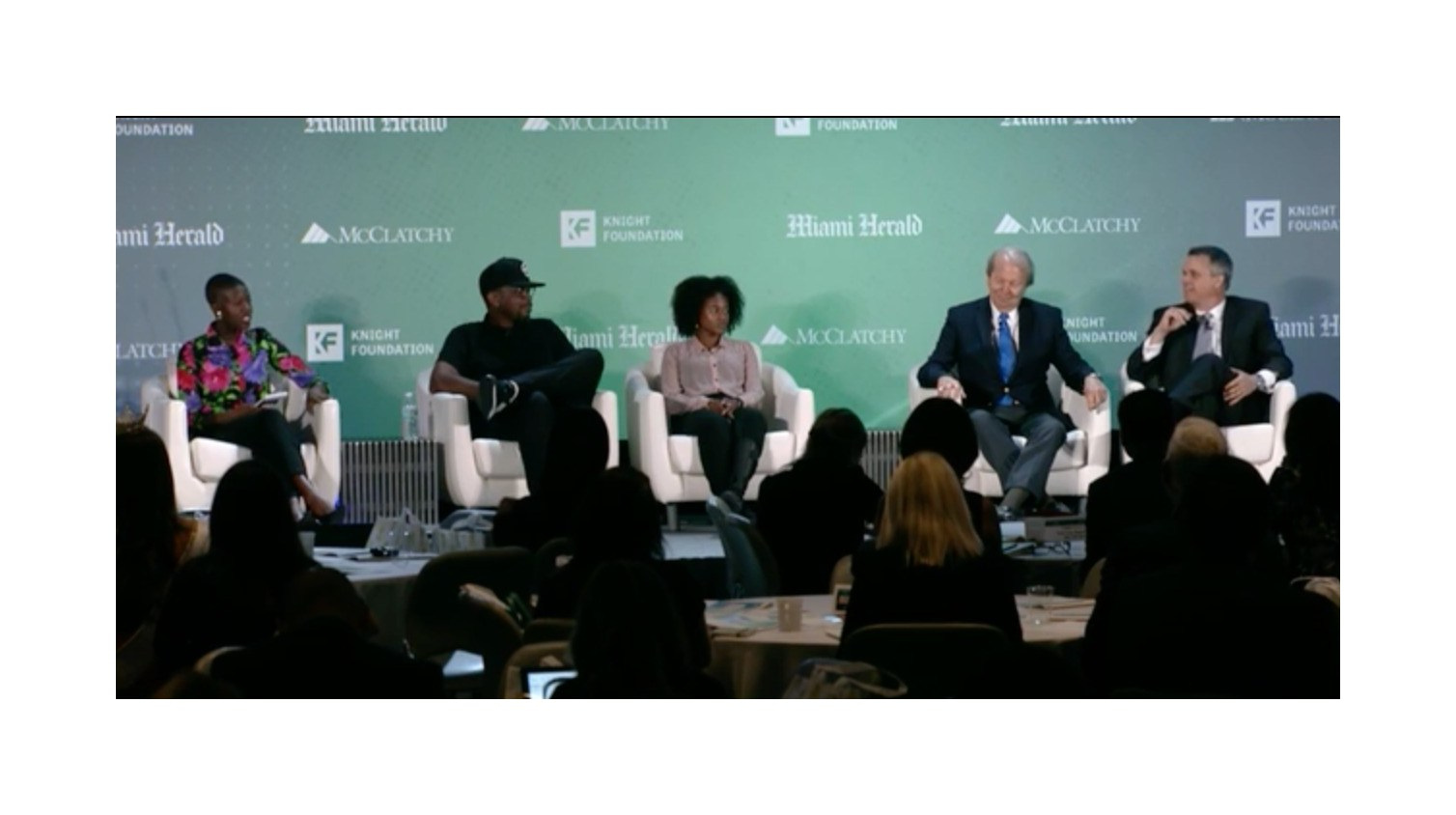(From left) Nadege Green, WLRN Public Radio reporter, speaks to Luther Campbell, Megan Hobson, Jon Mills and Bob McClure at the University of Miami’s Donna E. Shalala Student Center Nov. 14. Screenshot courtesy of Miamiherald.com
By Tim Fanning
MIAMI — For Megan Hobson, a Florida safe from gun violence means waking up without being afraid she’ll be shot again.
It means going to sleep and not seeing that day seven years ago when she was caught in the crossfire of a drive-by shooting in Miami Gardens.
A bullet from a high-powered rifle tore through her sister’s car, ripped through her hip and left her with physical and psychological scars she continues to grapple with today.
“It weighs heavy on my mind daily,” said Hobson, now 23, who spoke on a gun safety panel last week at the Florida Priorities Summit at the University of Miami. “I know when I go to sleep, the nightmares come and I see that I’m not as strong as I thought.”
The summit saw a diverse group of leaders from across the state tackle some of the most pressing issues facing Florida. Those leaders developed a series of policy recommendations on education, the environment, transportation, health care and gun violence for the next governor and Legislature.
Among those recommendations, influencers want lawmakers to clarify language of Florida’s controversial Stand Your Ground Law that would help law enforcement officers develop best practices for investigating cases where use of deadly force under life-threatening circumstances is permitted.
Influencers also urged legislators to create a statewide database for unlawful gun-related activities that would be reported under FBI supplementary homicide reports.
While mass shootings on school campuses in cities across the country have gripped headlines and inspired some gun safety reforms, there seems to be little conversation about daily gun violence in the state, said panelist Luther Campbell, a Miami-based rapper and social activist.
“(Gun violence) doesn’t seem to be an issue until 17 kids die in a school like Parkland,” said Campbell, who also founded the Liberty City Warriors, an inner city youth sports program. “We get 17 kids impacted by gun violence in a month in Liberty City.”
Shotspotter, a high tech gunfire-detection system installed by Miami police, reported that 8,280 shots were detected from March 2015 to March 2016.
Most of those shots were fired in three Miami neighborhoods, including Liberty City, a neighborhood in northern Miami, according to the Miami Herald.
Gun violence in Miami is a glimpse into the larger problem facing the Sunshine State, said Nadege Green, a social justice reporter at WLRN Public Radio.
In 2016, gun injuries were the second leading cause of death among children and teenagers in Florida, according to Florida Department of Health statistics.
Between 2010 and 2015, nearly 3,200 kids 17 and younger were killed or injured by firearms in Florida, a recent Tampa Bay Times investigation found. Put another way, a child in Florida was shot, on average, every 17 hours.
College campus shootings, along with other mass shootings, have gained a lot of attention over the past two decades. In 2007, a student killed 32 people at Virginia Tech. Since then, 320 people have been shot on college and university campuses in the United States, according to a Collegiate Times analysis.
Students at Marjory Stoneman Douglas helped lead the call for more gun control measures after a February shooting at their high school left 17 dead. Those efforts led Florida lawmakers to pass some gun law changes — including a higher minimum age to purchase some firearms and a ban on bump stocks.
But those measures are far from complete, according to the vast majority of Florida influencers, who were surveyed in the months before last week’s summit in Miami.
Many of the influencers surveyed believed better databases need to be created and maintained to improve coordination and streamline the process of issuing concealed carry licenses and to ensure that criminal and mental health records are easily accessible.
Influencers also wanted tougher regulations on high-powered assault rifles, such as the AR-15, a gun used by several mass shooters. The AR-15 is also a preferred gun used by gang members in Miami, activist Campbell said.
Panelist, Jon Mills, a University of Florida law professor, who sat on the Constitution Revision Commission 20 years ago, is drafting a state constitutional amendment to halt the sale of tactical semi automatic rifles.
Backed by the left-leaning political committee Ban Assault Weapons Now, Mills hopes to put it before voters in 2020.
Once on the ballot, the amendment would need 60 percent of the vote to take effect. Floridians seem to support the effort. In March, Politico reported that a recent Quinnipiac University poll of Florida voters found that 62 percent favored a ban on assault weapons.
But such an amendment would undoubtedly be opposed by the powerful National Rifle Association, which has thwarted countless gun control moves in Florida in recent years.
Although many of the panelists at the University of Miami last week agreed with the influencers’ policy recommendations, some warned it would do little to curb gun violence in inner cities.
“An increase in gun control will not equate to fewer deaths,” said panelist Bob McClure, the president of the James Madison Institute a right-leaning, Tallahassee-based think tank.
Lawmakers must also work to improve education, trauma resources, security and employment in low-income neighborhoods, McClure said.
“We need to create hope,” McClure said. “We need better education and opportunity. It’s hard to have hope without security and economic opportunity.”
Editor’s note: Tim Fanning was one of 14 collegiate journalists invited to cover a “Florida Priorities Summit” in Miami on Nov. 13-14. The summit featured some of the state’s most influential doers and thinkers and was sponsored by the Knight Foundation, the Miami Herald, el Nuevo Herald, Bradenton Herald and the McClatchy Company.



